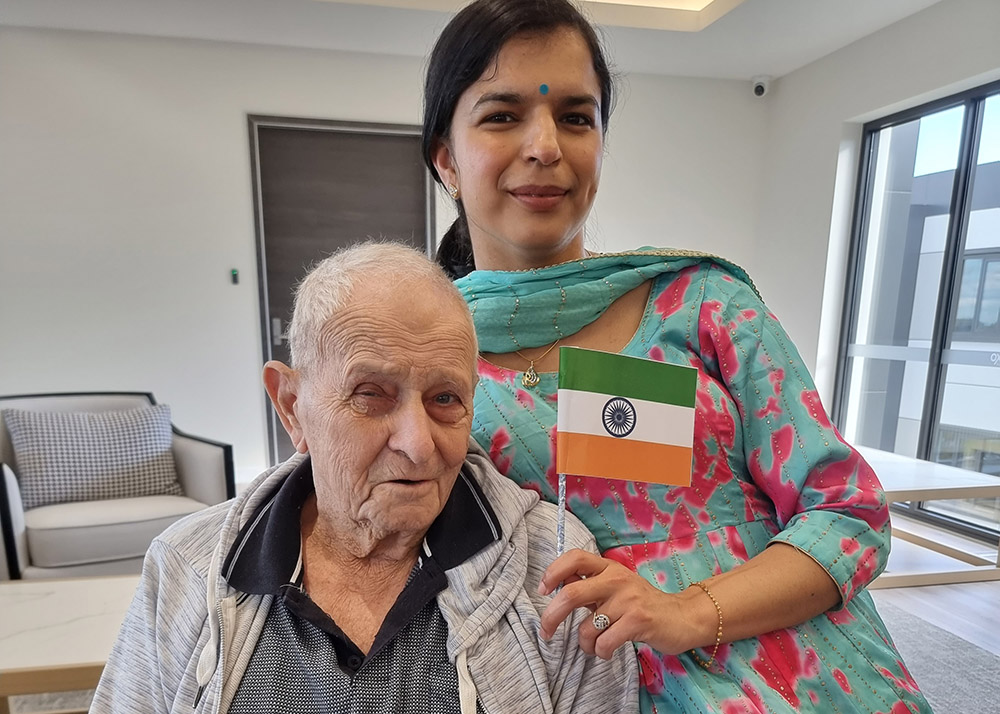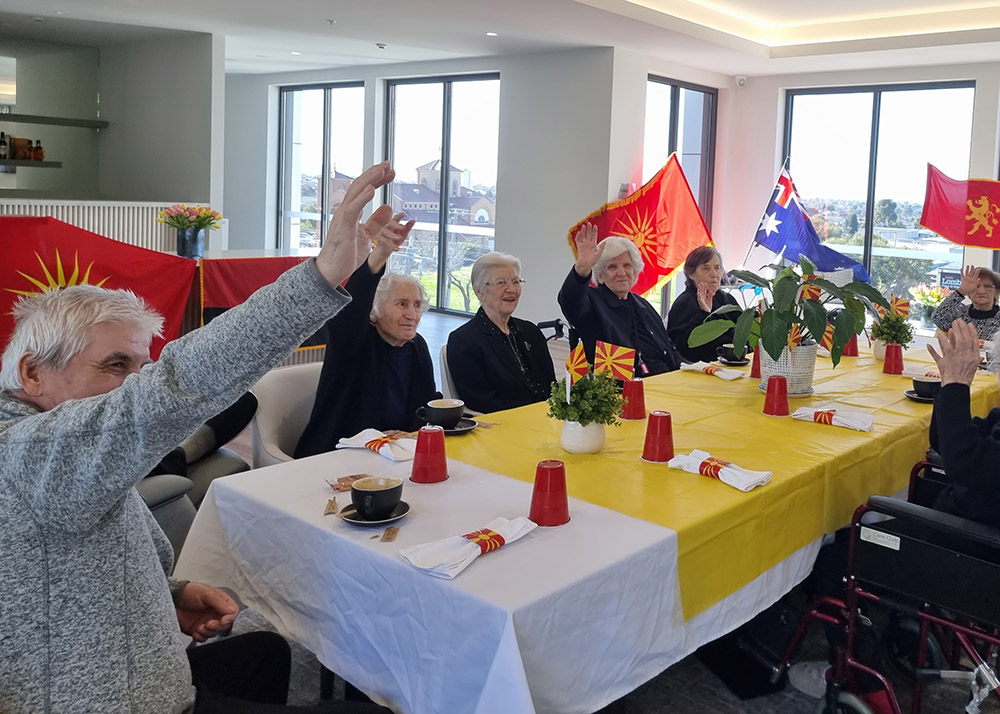Cultural activities and events in aged care: How diversity enriches daily life
Cultural expression is more than tradition. It is identity, memory, and connection. For older Australians, especially those from culturally and linguistically diverse (CALD) backgrounds, opportunities to celebrate culture can transform daily life in aged care.

Cultural expression is more than tradition. It is identity, memory, and connection. For older Australians, especially those from culturally and linguistically diverse (CALD) backgrounds, opportunities to celebrate culture can transform daily life in aged care.
At Oxa Care, we believe culture should not be confined to special events; it should be woven into everyday routines, relationships, and environments so residents feel truly at home.
Why cultural activities matter in aged care
Australia’s aged care landscape is rapidly evolving. With over 30% of older Australians born overseas and many speaking a language other than English at home, cultural diversity is a defining feature of our communities.
By 2026, nearly 40% of people aged 65 and over will come from culturally and linguistically diverse (CALD) backgrounds. For aged care providers, this means cultural activities and events are no longer 'extras'; they are essential to delivering meaningful, person-centred care.
Benefits for emotional, social, and cognitive wellbeing
Cultural activities for elderly residents are powerful tools for connection and wellbeing. They stimulate memory, particularly for residents with dementia, by triggering familiar songs, stories, or rituals. They also encourage social engagement, reducing loneliness and isolation, while strengthening community bonds.
Engaging in cultural activities in aged care can:
- Help improve mood and reduce symptoms of depression or anxiety.
- Provide opportunities for meaningful interaction with peers and staff.
- Support physical engagement through dance, movement, or active games.
- Encourage pride and identity by reinforcing cultural traditions and values.
- Strengthen family bonds when relatives are invited to join activities.
Supporting inclusion and belonging through culture
For CALD elders, aged care can sometimes feel overwhelming if their cultural needs are not recognised. By celebrating language, traditions, and customs, providers can help residents feel valued and understood. This sense of belonging reduces care resistance and builds trust with families, many of whom want reassurance that their loved one’s cultural identity will be respected.
Types of cultural activities for elderly residents
Cultural activities take many forms, each offering residents opportunities to connect and build community with others. They also create avenues for fun, learning, and self-expression, making everyday life in cultural aged care more vibrant.
Music, art, dance and theatre from diverse cultures
Music and the arts transcend language. From Greek folk dances to Italian opera and Indigenous art workshops, artistic expression allows residents to connect with their heritage while sharing it with others. Performances by local cultural groups or intergenerational art projects can also bring joy and stimulate creativity.
Storytelling, reminiscence therapy and cultural games
Storytelling has always been central to cultural preservation. In aged care, it can take the form of reminiscence therapy, where residents share migration stories, folktales, or childhood experiences. Traditional games, whether it’s mahjong, bocce, or card games, create opportunities for light-hearted connection and cultural pride.
Food and cooking-based cultural activities
Food is one of the strongest ties to home. Cooking classes, themed meal days, or recipe-sharing activities allow residents to enjoy familiar flavours while introducing others to their traditions. Families often play an active role here, contributing treasured recipes or joining cooking sessions.

Examples of cultural events in aged care facilities
Cultural events bring fresh energy into the community by creating moments of celebration that everyone can enjoy.
Multicultural days and international festivals
Events such as Harmony Week or multicultural festivals showcase the diversity within aged care homes. They may feature traditional performances, clothing, and cuisines from multiple cultures. Collaborations with groups like Multicultural Arts Victoria provide inspiration and ensure events are authentic.
Religious celebrations and national holidays
From Ramadan to Christmas, Lunar New Year to Diwali, acknowledging spiritual and national traditions allows residents to celebrate meaningfully. These observances not only comfort individuals but also invite cross-cultural learning among peers.
Cultural fashion shows and language events
Fashion and language are visible markers of identity. Hosting fashion parades with traditional attire or cultural language events such as poetry recitals can boost confidence, foster intergenerational exchange, and promote pride in heritage.
How aged care services embrace cultural diversity through events
Aged care providers can foster inclusivity by making cultural events a regular, meaningful part of community life rather than one-off occasions.
Involving CALD communities and families
Partnerships with cultural organisations and families ensure cultural events feel authentic. The Ethnic Communities Council of Victoria (ECCV) offers guidance on engaging with CALD communities to strengthen participation and inclusivity.
Co-designing events with residents and staff
Residents should have input into which traditions are honoured and how. Co-design encourages ownership and ensures activities reflect lived experiences rather than token gestures. Staff involvement is equally vital, as they bring the cultural knowledge and care expertise needed to deliver safe, respectful events.
Creating culturally safe spaces for participation
Cultural safety means more than inclusion; it means residents feel confident their practices will be respected. This includes offering same-gender care where appropriate, designing accessible prayer or meditation rooms, and incorporating meaningful cultural symbols in shared spaces.

Cultural activities in aged care: Melbourne examples
Melbourne offers a rich backdrop of multicultural influences that make it an ideal location for showcasing inclusive aged care practices.
Melbourne-based providers leading cultural engagement
Melbourne’s cultural vibrancy makes it a leader in inclusive aged care. Oxa Care integrates cultural calendars into programming, with authentic celebrations led by elders and community representatives, ensuring intergenerational activities and cultural mentorship enrich daily life for residents.
- Facilities often host cultural festivals featuring traditional food stalls, music performances, and art displays.
- Intergenerational programs bring local school children together with residents to share language and stories.
- Cultural mentorship initiatives pair staff with cultural leaders who guide event planning and delivery.
Local partnerships with ethnic and community organisations
Collaboration with cultural groups, schools, and places of worship ensures residents remain connected to their communities. These partnerships also provide opportunities for excursions to cultural festivals, museums, or places of worship.
- Partnering with community choirs or dance troupes to perform at facilities.
- Excursions to local cultural hubs such as markets, libraries, and places of worship.
- Joint projects with schools where students learn cultural crafts from residents.
Regional and council support for multicultural aged care programs
Local councils and state initiatives provide additional opportunities. The Victorian Government’s Multicultural Policy underpins inclusion efforts across services, ensuring residents in Melbourne and regional areas benefit from culturally safe care.
- Council-funded events such as multicultural fairs and cultural art exhibitions.
- Regional grants that support aged care facilities in running cultural workshops.
- Access to local interpreters and cultural liaisons through council networks
Planning and running inclusive aged care culture events
Thoughtful planning ensures that cultural activities are meaningful, inclusive, and sustainable for both residents and staff.
Tips for cultural sensitivity and representation
Successful cultural events require sensitivity. Providers should keep the following tips in mind:
- Avoid stereotypes or tokenistic gestures that oversimplify cultural traditions.
- Ensure balanced representation by including voices from multiple cultural groups.
- Involve cultural leaders or community representatives in planning and delivery.
- Prioritise authenticity by focusing on meaningful rituals, traditions, and practices rather than performative gestures.
Tools for event planning and resident participation
Recommended tools for even planning include:
- Use cultural calendars to schedule events that align with key cultural or religious dates.
- Conduct regular consultation processes with residents and families to gather input on desired activities.
- Integrate cultural preferences into individual care plans to personalise experiences.
- Keep ongoing records of participation and feedback to improve future event planning.
Adapting activities for physical or cognitive needs
Not all residents will engage in the same way. Activities should be flexible, whether through smaller group sessions, sensory-based programs, or simplified games for residents living with dementia. Inclusivity ensures everyone can participate.
Experience a vibrant, inclusive aged care community at Oxa Care
At Oxa Care, we believe that culture should be part of everyday life, from meals and daily routines to the way we design our spaces and celebrate special moments. By encouraging residents to share traditions, stories, and skills, we build communities that are vibrant, connected, and full of joy.
When families are looking for aged care services that truly value cultural identity and inclusivity, Oxa Care stands as a trusted choice for creating a home where every resident feels respected and celebrated. Visit our residential aged care home and experience the difference for yourself.


